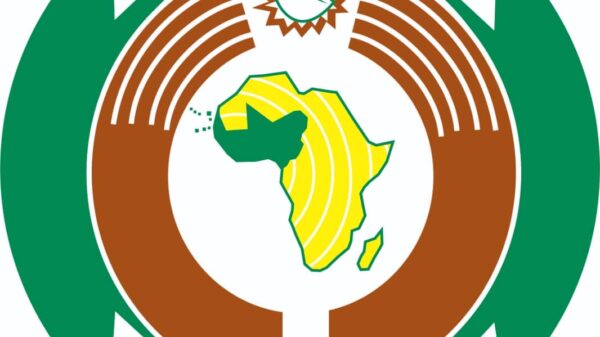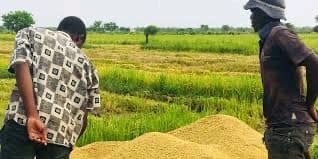Adnan Adams Mohammed
Local rice farmers are lamenting low patronage for their harvest as imported varieties have dominated the market.
A session of the rice farmer from Gbdembilisi community, located in the Builsa South District of the Upper East Region, are calling for government’s intervention to boost their sales so they can recover their cost of cultivation.
Gbdembilisi, known for its fertile lands and dedicated rice cultivation, faces a crisis as the farmers report a shortage of buyers for their abundant rice harvest.
“This year, a lot of our buyers and companies are complaining that the government has imported a lot of rice into the country, and because of that, we are not getting buyers”, John Amobil shared the rice farmers concerns in an interview.
“Last year, for instance, Nigerians and other countries were in to buy our rice, but the government has stopped them from entering the country to buy rice. The government is also importing foreign rice, and all the buyers are complaining that when they buy our rice and mill, they don’t get buyers.”
The Chairman of the Builsa South Rice Farmers Association, Cezar Akinkang, in a separate interview also pointed out that, cheaper foreign options divert consumers from locally produced grains, resulting in a surplus that local markets struggle to absorb.
“What we heard is that the buyers are complaining that our rice is more expensive than the foreign rice, and the reason why our rice is more expensive than the foreign rice is that the inputs are costly. So, we are appealing that the government should reduce the prices of inputs, and if there is a subsidy, it will help us farmers. So that our price too will come down to meet the needs of buyers and consumers,” Mr. Akinkang appealed.
The farmers also advocated for measures such as a potential ban on imported rice to level the playing field and provide local producers with a fair chance to sell their harvest.
This call is in line with the opposed government’s plan to pass a Legislative Instrument to restrict import of some listed food items which faced strong opposition in parliament and from some major stakeholders. This forced the government to later shelve the plan. The opposers wanted the government to embark on wider consultation to restructure the bill.
As it stands now, no one knows when the Import Restriction Bill will be back to parliament.
Briefing media men in Parliament about the Bill, the Minister of Trade and Industry, K.T Hammond said, “Stomach of animals, bladder and the chunk of intestines (yemuadie), the country had had to put in an amount of about $164 million towards the importation of these items. We are taking steps to ensure that in terms of rice, there’s no poverty of rice in the country.”
He emphasized, “By these restrictions, we are not going to ensure that there’s no food in the country at all; that is not the point at all. There have to be some efforts by the government to ensure that we go back to Acheampong’s operation feed yourself. There are about 22 items on the list, one of them, I think, is diapers.”
Also, a major challenege complicating the farmers situation is the lack of enough warehouses leading to high cost of storing the harvest as well as exposing the harvest to insects and pests attacks.
The farmers mostly resort to storing their harvest at home and in drinking bars, underscoring the urgent need for additional storage facilities to handle the bountiful yield.
Amidst the challenges, farmers highlight the high cost of inputs, machinery services, and a deficient road network contributing to post-harvest losses.
Ali Gafaru, a farmer, says the downturn in rice sales does not only affect them economically but also prompts lenders to pursue repayment of loans taken for farming ventures.
“You go for a loan, and the agreement is that you will pay for a timeframe. Now, how are we going to pay for the loan if we are unable to sell our produce?” he asked.
Ghana currently consumes about 1.5 million metric tonnes of rice annually, with approximately 50% being imported due to unpredictable quality and quantity of yields. This is largely due to climate change affecting rainfall patterns in a region where most smallholder farmers practice rain-fed agriculture.
While total rice consumption stood at 1.4 million metric tonnes in 2022, imports valued at US$560 million accounted for 800,000 metric tonnes (mt) of the consumption figure, with domestic production catering for the remaining demand – according to data from IDH Sustainable Trade.
Also, according to the Observatory of Economic Complexity, Ghana imported US$552 million worth of rice in 2021, becoming the 13th largest importer of Rice in the world. At the same year, rice was the 3rd most imported product in Ghana. Ghana imports rice primarily from: Vietnam ($394M), Thailand ($53.3M), India ($50.9M), China ($21.7M), and Pakistan ($21.2M).


















